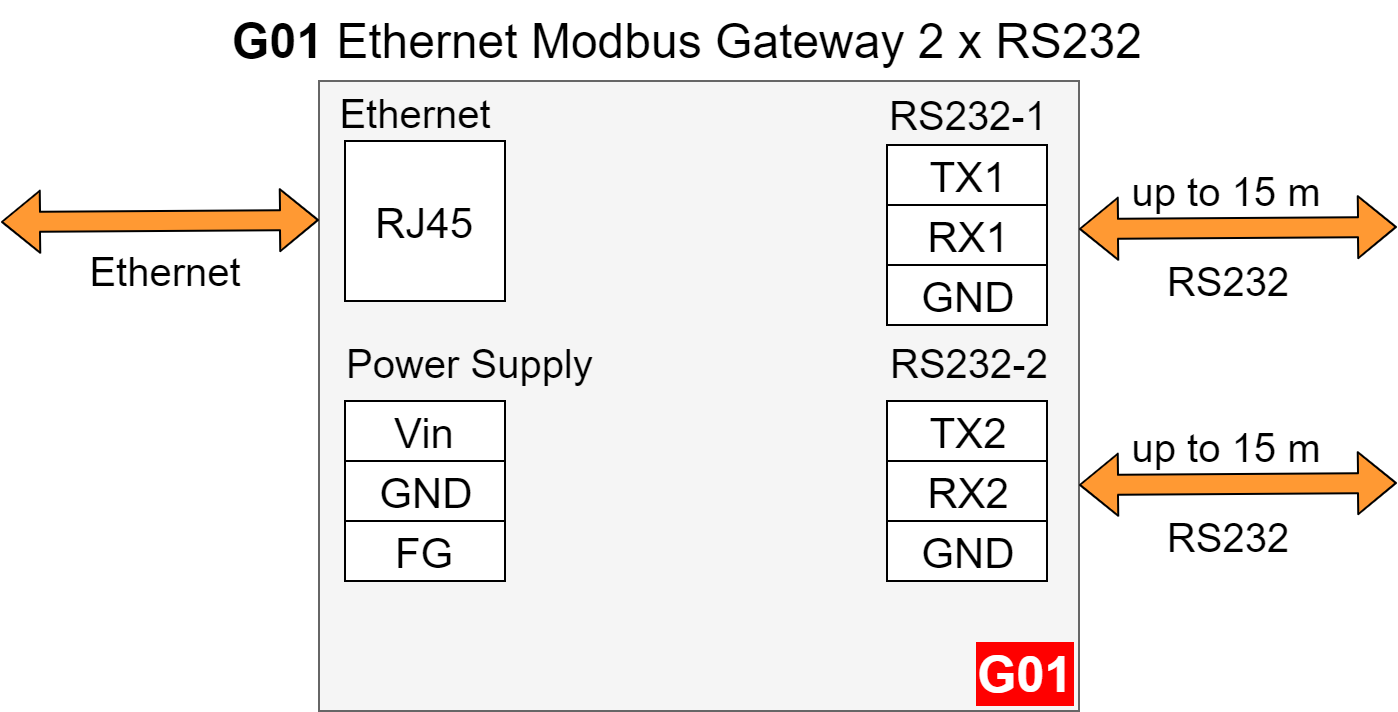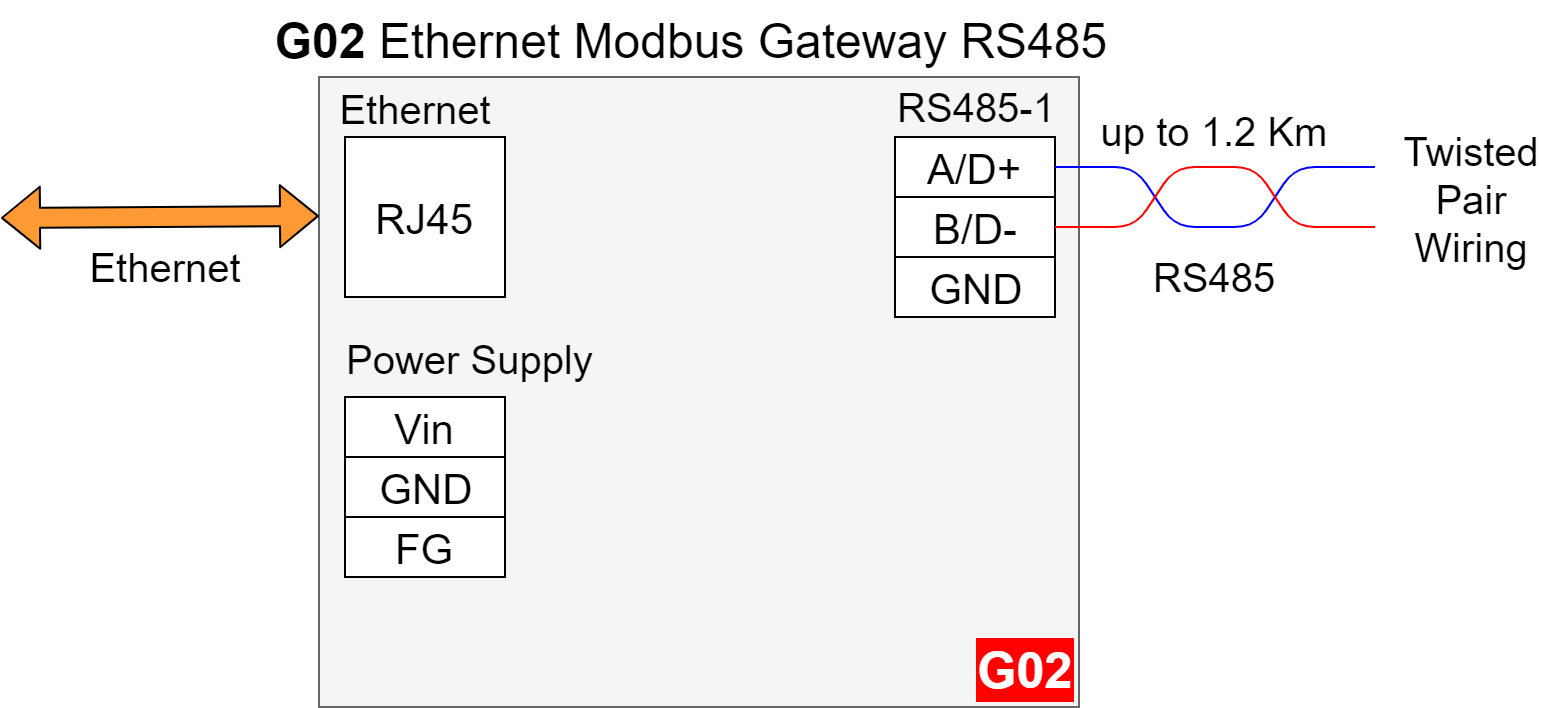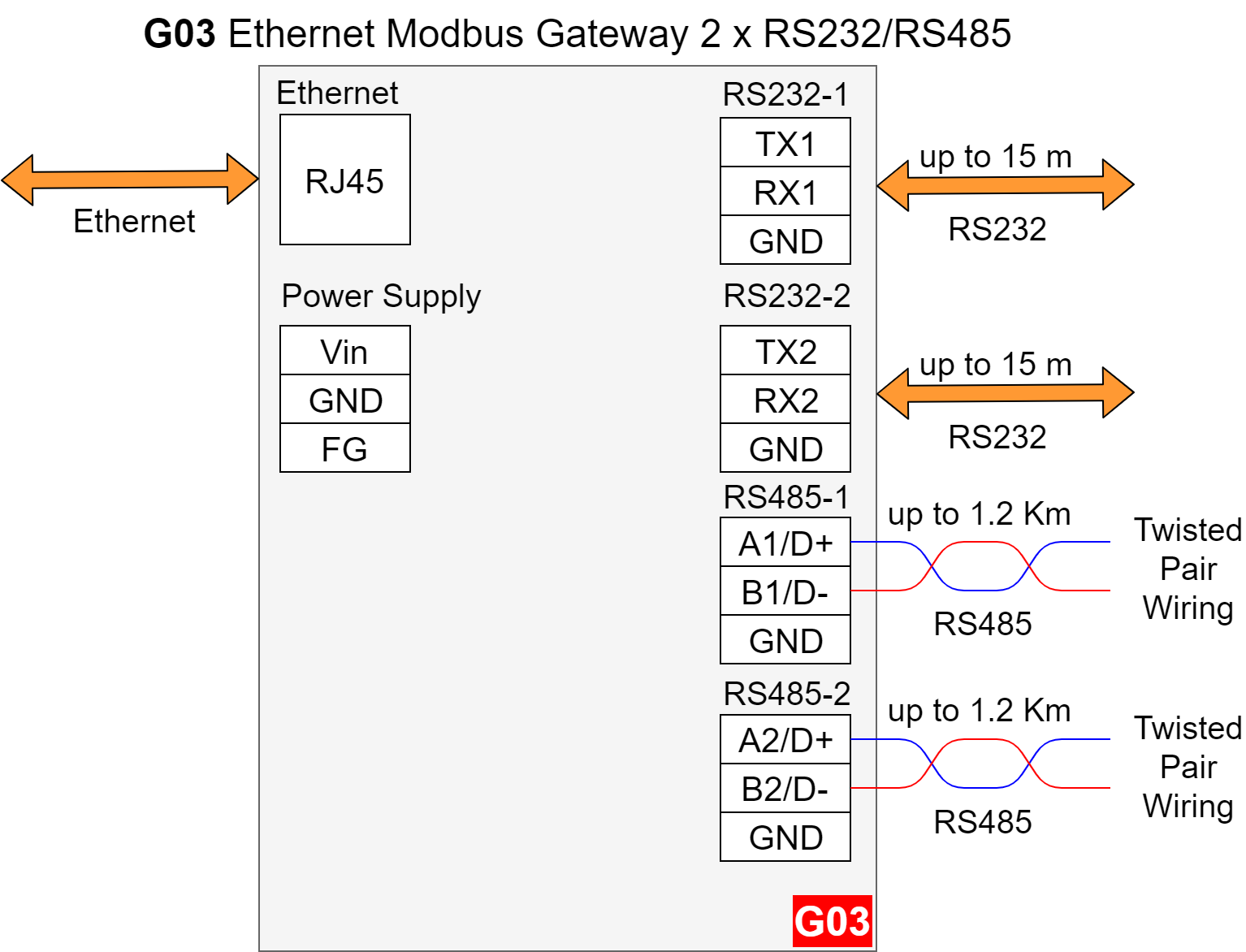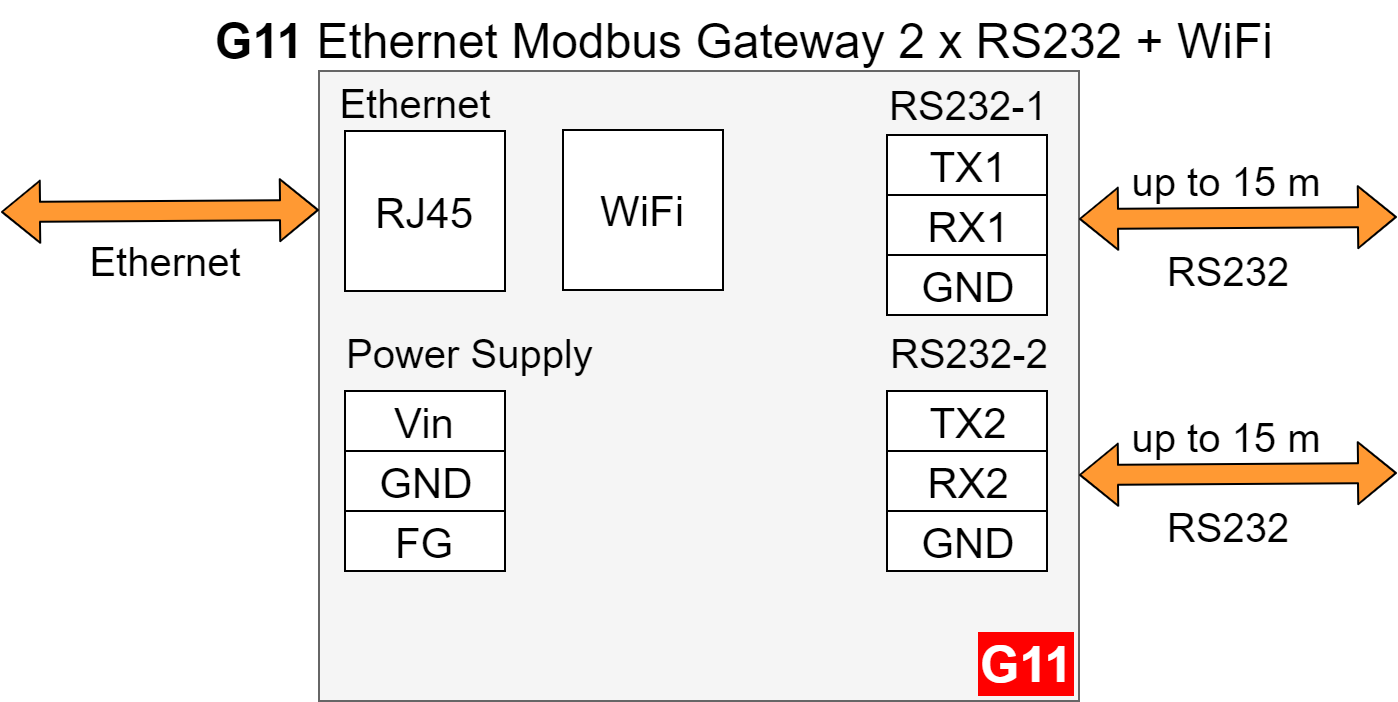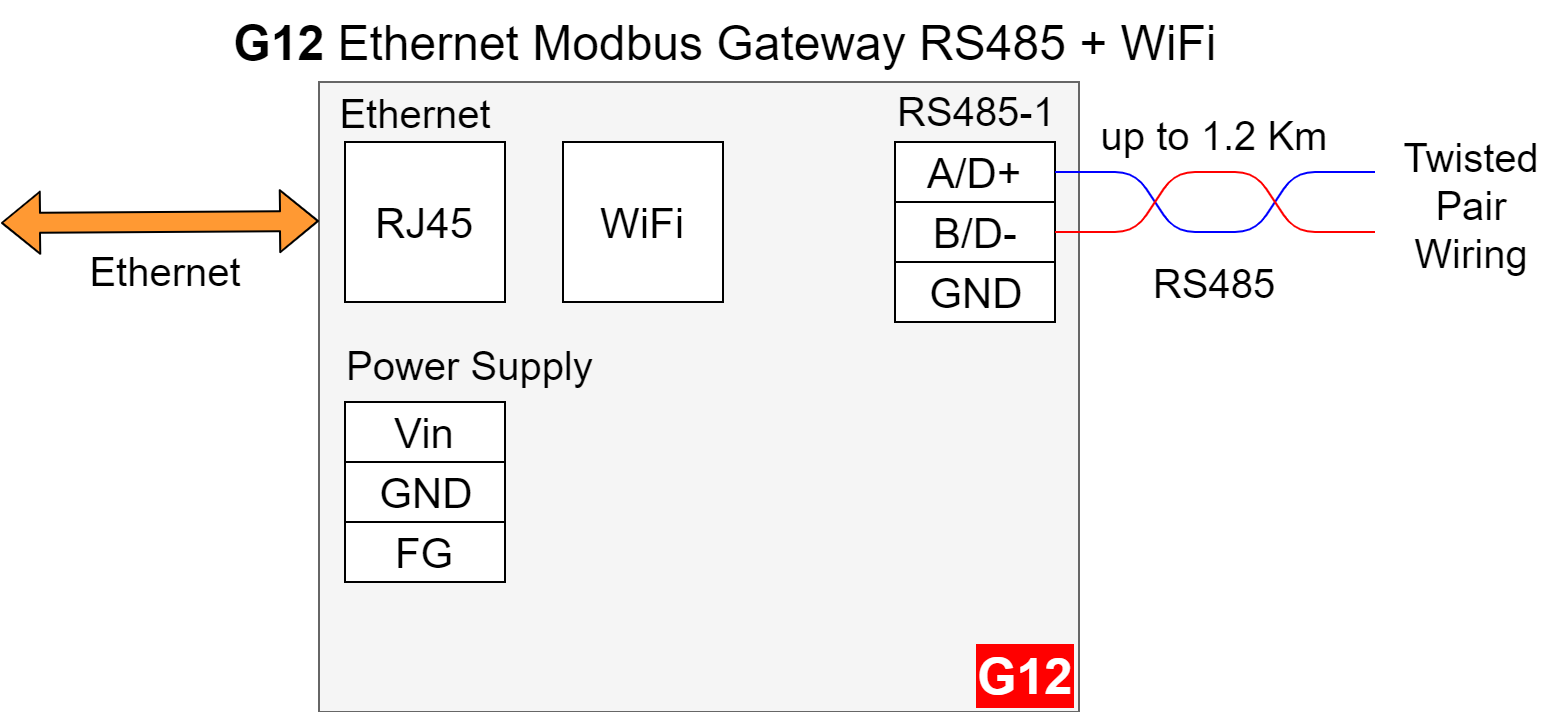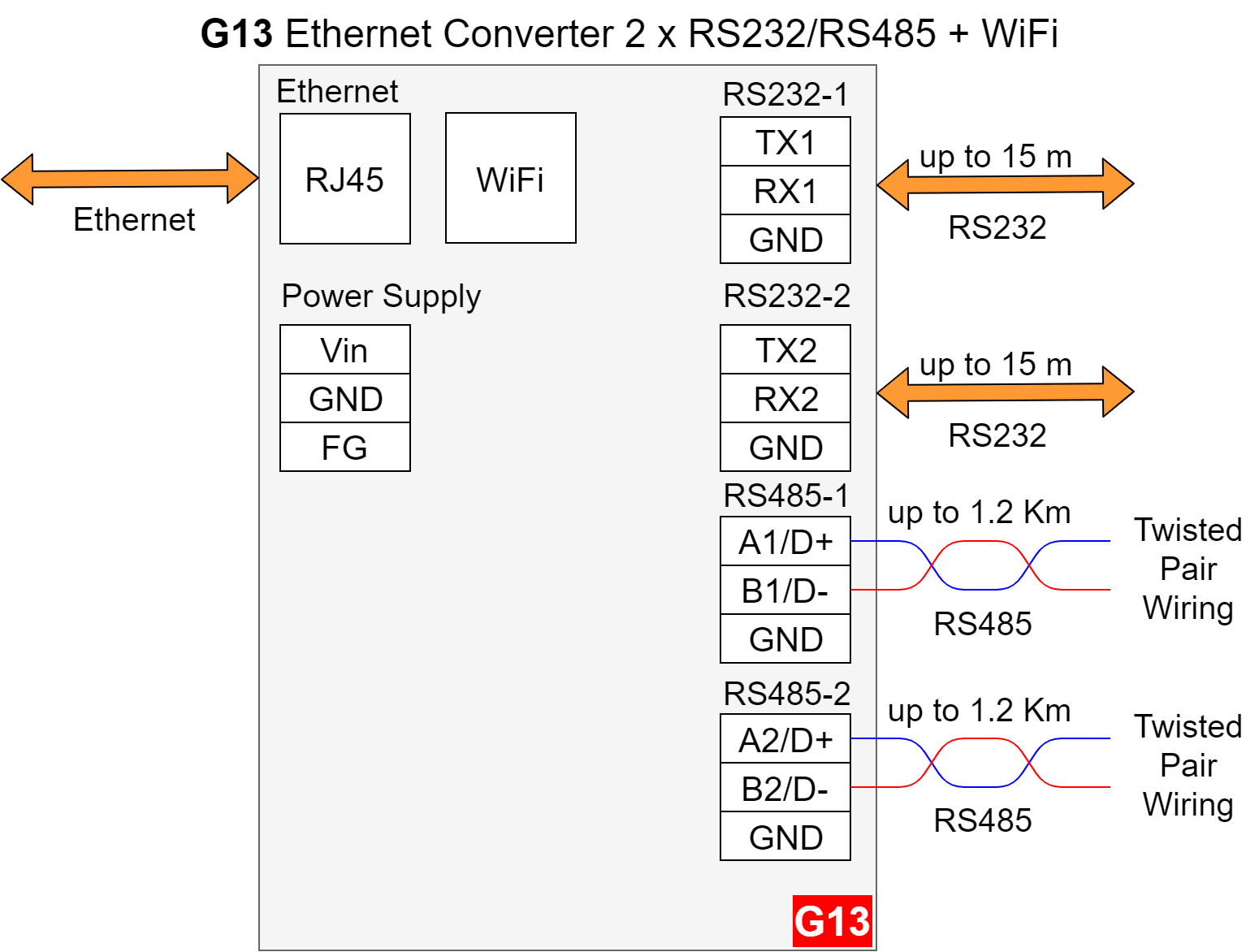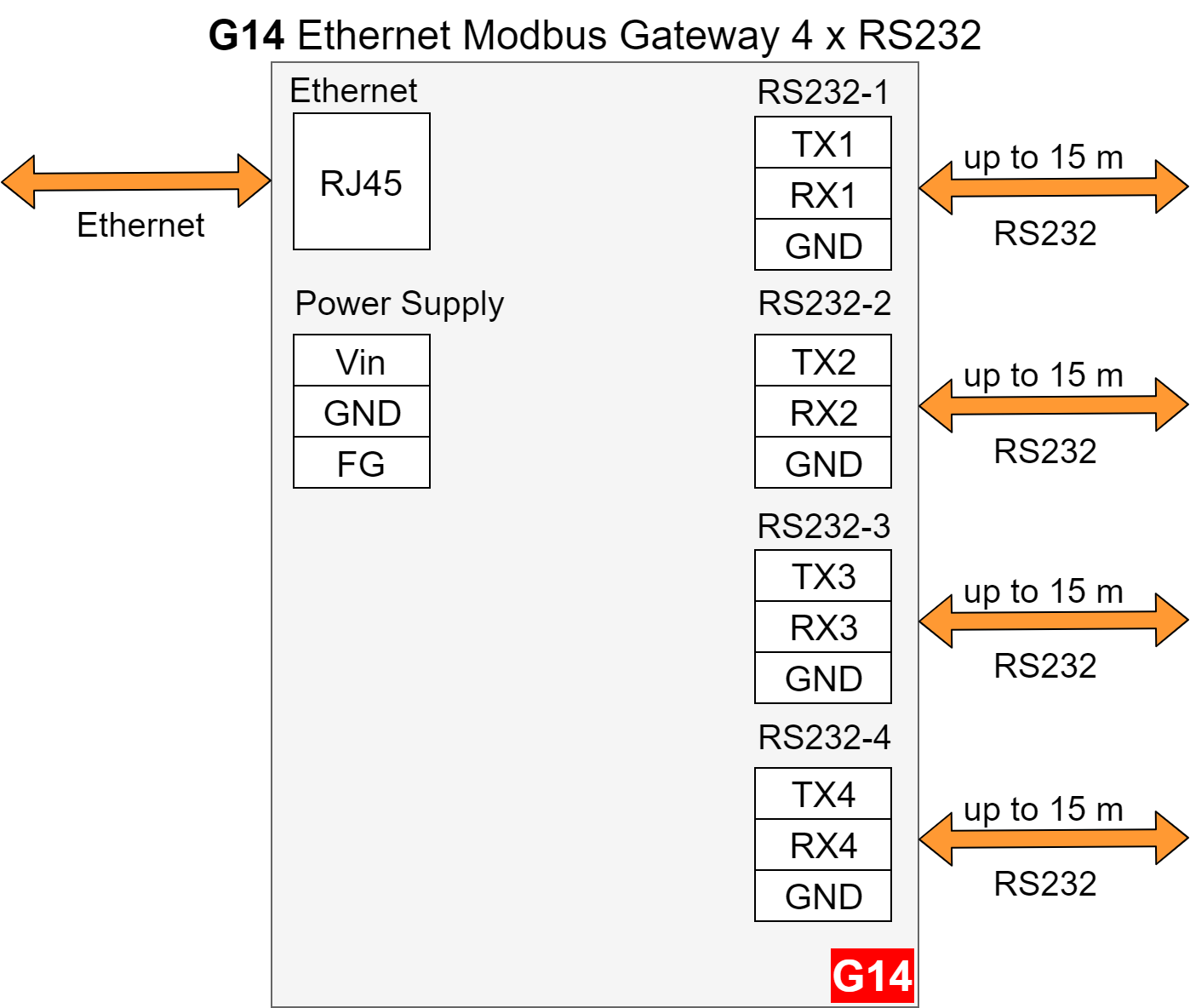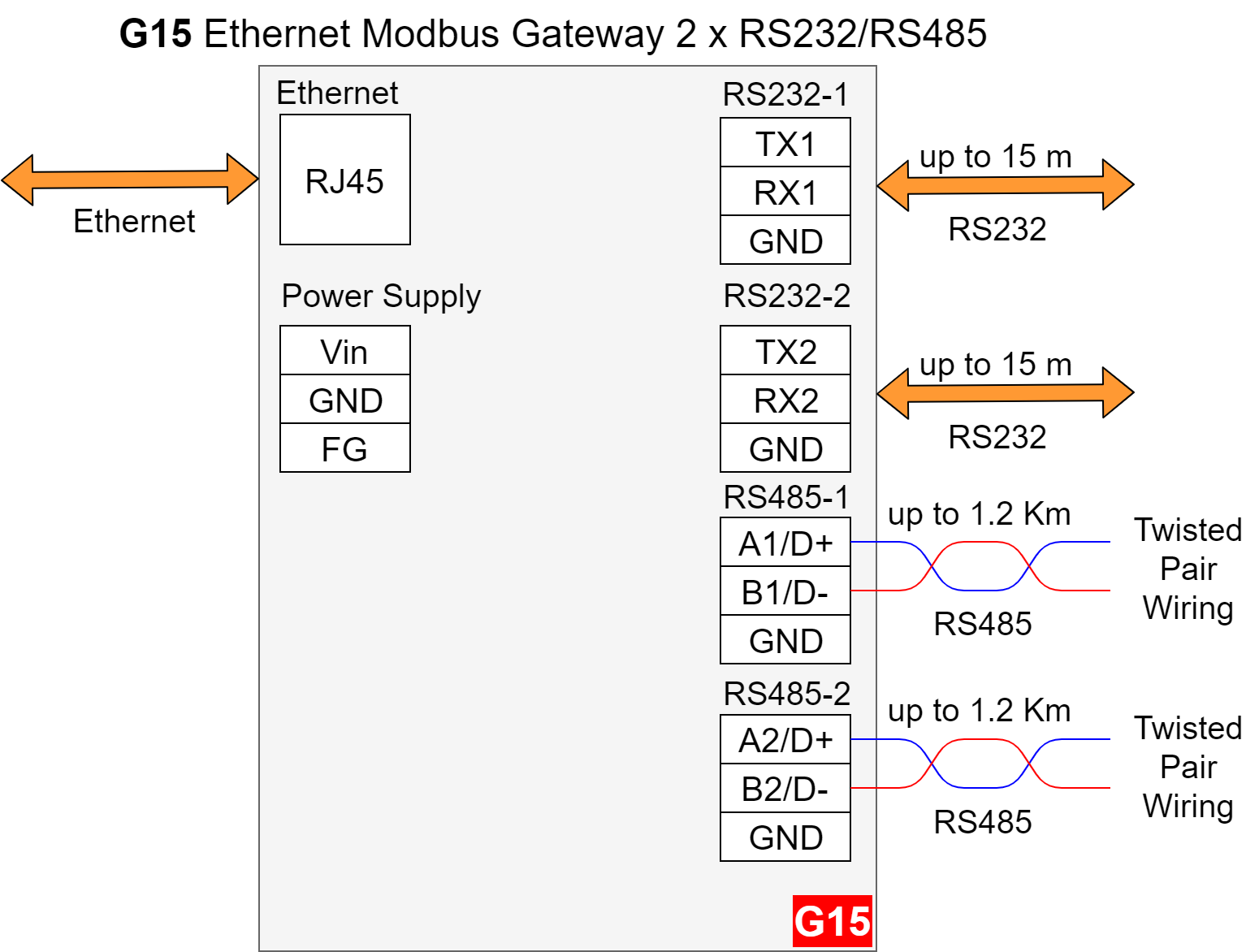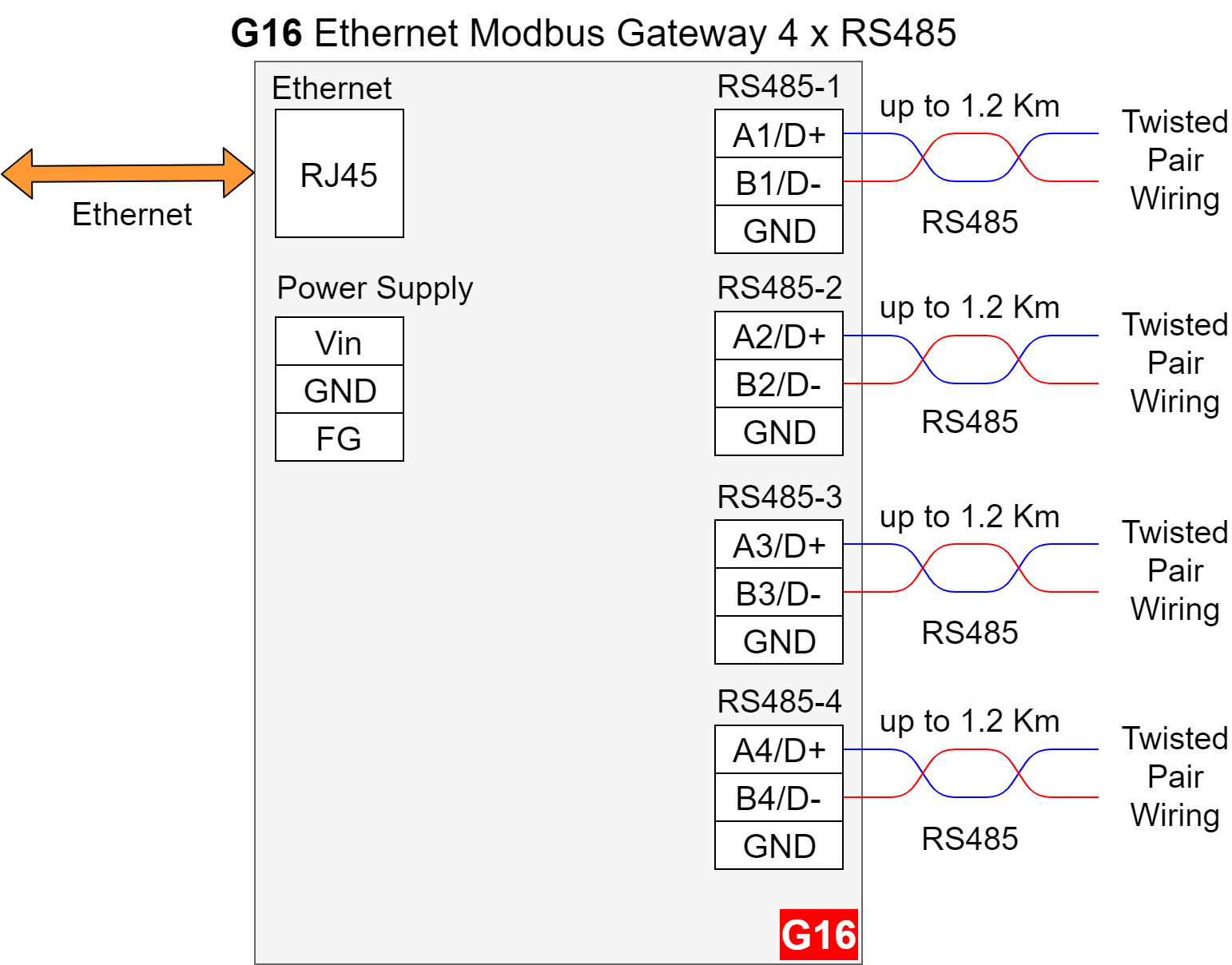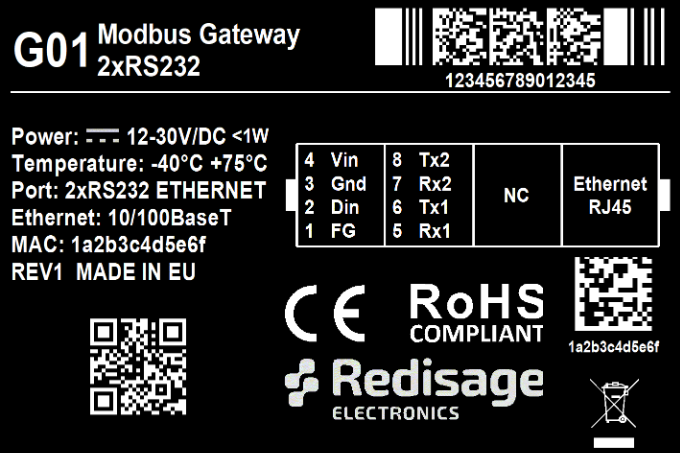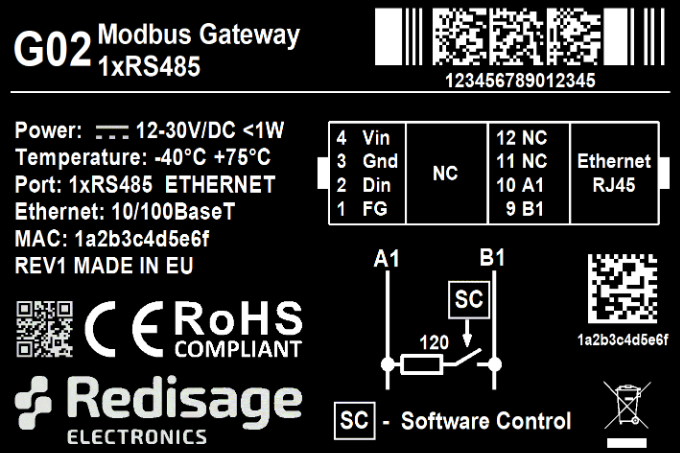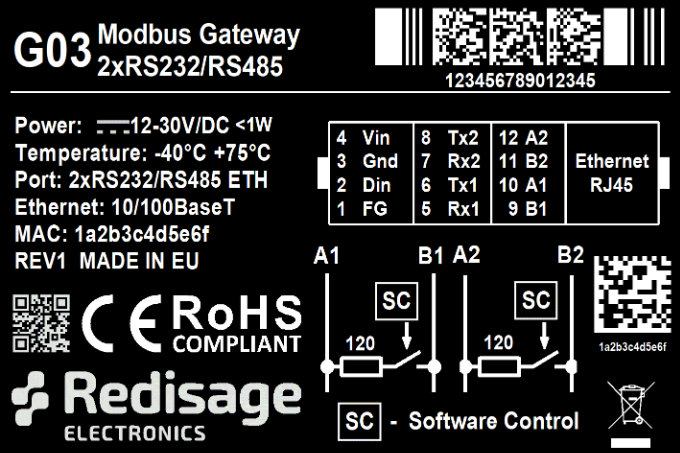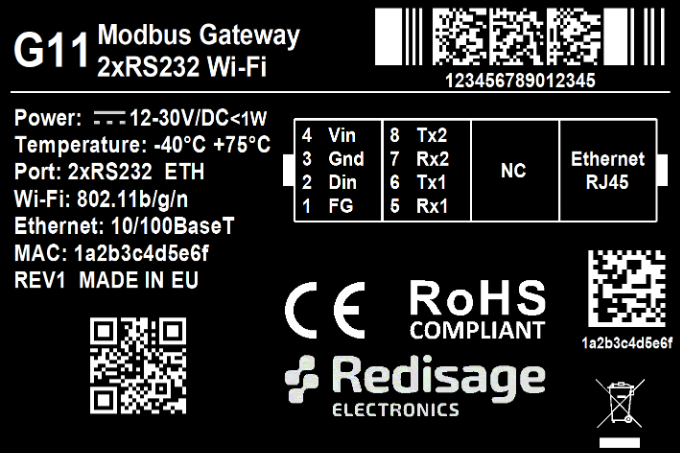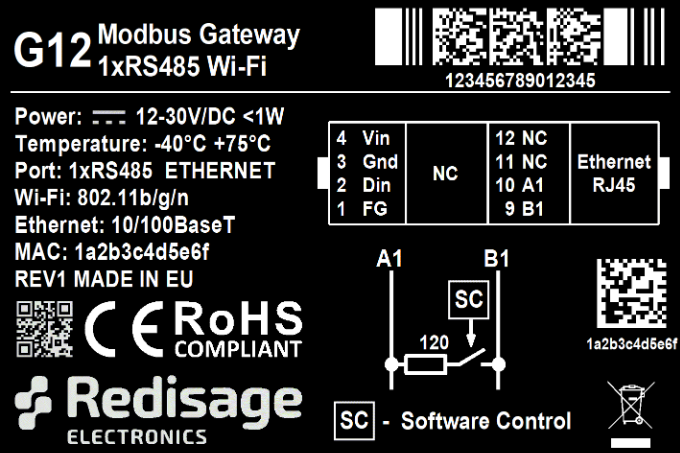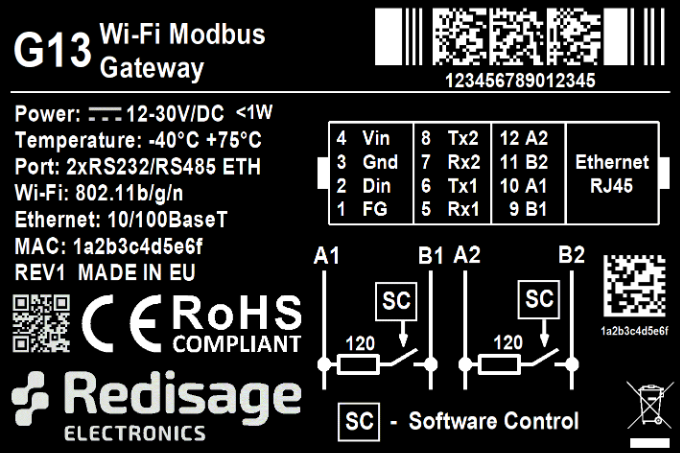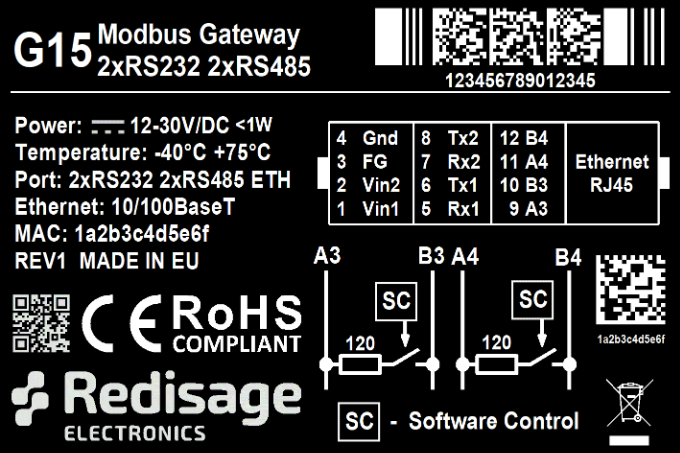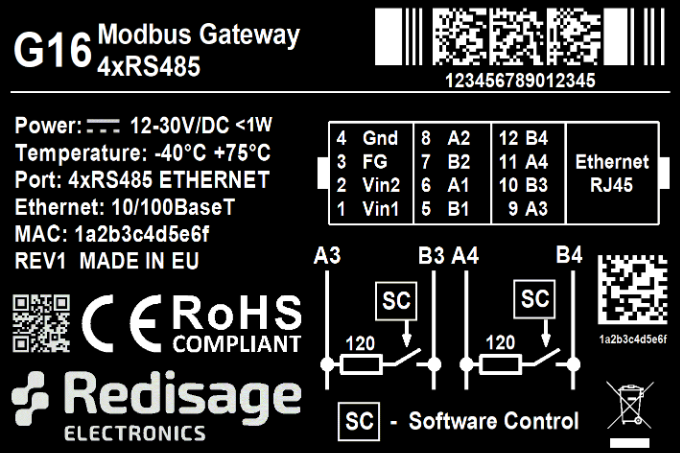Ethernet Modbus Gateways Data Sheet
Not found required information?
- or
- Contact us at contact@redisage.com.
G01 G02 G03 G11 G12 G13 G14 G15 G16
| Features
|
Introduction
G01-G03 and G11-G13 are a family of products that are reliable Gateways based on the ESP32 Xtensa LX6 microcontroller, extending the capabilities of industrial devices.
G14-G16 are a family of products that are reliable Gateways based on the STM32F4 microcontroller, extending the capabilities of industrial devices.
The addition of a network interface allows remote access and full control of communication via a computer.
The user performs the basic configuration of transmission parameters in the browser.
Dedicated EMC integrated circuits guarantee improved connection quality by limiting the impact of interference typical for an industrial environment.
Specifications
| Redisage PN | G01 | G02 | G03 | G11 | G12 | G13 | G14 | G15 | G16 | |
|---|---|---|---|---|---|---|---|---|---|---|
| Ports | RS232 | 2x | - | - | 2x | - | - | 4x | 2x | - |
| RS485 | - | 1x | - | - | 1x | - | - | 2x | 4x | |
| RS232/RS485 | - | - | 2x | - | - | 2x | - | - | - | |
| Microcontroller | ESP32 | STM32F4 | ||||||||
| WiFi | N/A | 802.11 b/g/n 150Mbps/2.4GHz | N/A | |||||||
Power | Voltage | 12-30VDC | ||||||||
| Power | < 1W | |||||||||
| Frame Ground Connection | Yes | |||||||||
Baudrate | up to 115200 bps | |||||||||
| LED Indicators | Communication Tx, Rx, and Power | |||||||||
| RS485 Termination | 120 ohm Manually Enabled | |||||||||
| Connector | RS232/RS485 | 8 Pin Terminal Block Max 2,5mm2 Wire | ||||||||
| Power | 3 Pin Terminal Block Max 2,5mm2 Wire | |||||||||
| Ethernet | RJ45 | |||||||||
Transmission | RS485 | Max. 1,200 m at 9.6 kbps; Max. 400 m at 115.2 kbps | ||||||||
| Mounting and Enclosure | DIN Rail, Plastic PA - UL 94 V0, Black/Green | |||||||||
| Temperatures | -40°C to +75°C Operating and Storage | |||||||||
| Humidity | 10 - 90% RH, Non-Condensing | |||||||||
ESD Protection | ±4kV contact discharge / ±8kV air discharge | |||||||||
| Certification | CE, RoHS | |||||||||
Applications
G01 - Ethernet Modbus Gateway 2x RS232
G02 - Ethernet Modbus Gateway 2x RS485
G03 - Ethernet Modbus Gateway 2x RS232/RS485
G11 - Ethernet Modbus Gateway 2x RS232 + WiFi
G12 - Ethernet Modbus Gateway 2x RS485 + WiFi
G13 - Ethernet Modbus Gateway 2x RS232/RS485 +WiFi
G14 - Ethernet Modbus Gateway 4 x RS232
G15- Ethernet Modbus Gateway 2 x RS232/RS485
G16 - Ethernet Modbus Gateway 4 x RS485
Frame Ground FG
Electronic circuits are constantly prone to electrostatic discharge ESD.
Rediisage Electronics modules feature a design for the frame ground terminal block FG.
The frame ground provides a path for bypassing ESD, which provides enhanced static protection ESD abilities and ensures the module is more reliable.
Connecting FG terminal block to the earth ground will bypass the ESD disturbances outside the device so will provide a better level of protection against ESD.
Frame Ground FG connection referece drawing.
If earth ground is not availabe FG can be left floating or can be connected with power supply GND.
Pin Assignments
G01
| G02
|
G03
| G11
|
G12
| G13
|
G14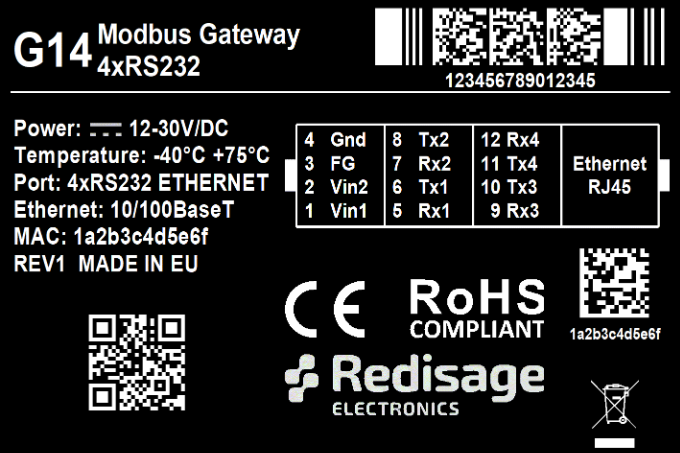 | G15
|
G16
| |
Enclosure Dimensions
2U Module Enclosure.
98 x 22.5 x 56.4
Units: mm.
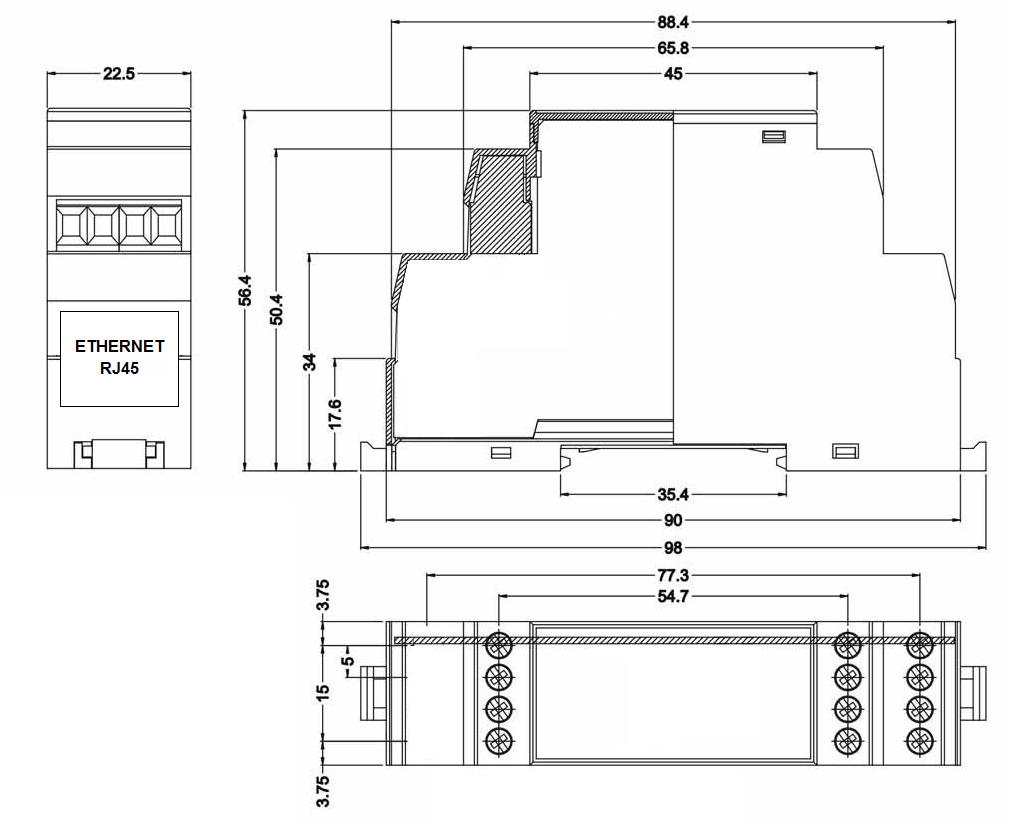
3D Model
3D model for reference only !
Getting Started
Power Supply
Ethernet Modbus converters G01-G03 and G11-G16 have wide voltage power input 12-30 V/DC, the power consumption is less than 1 W.
LED Indicators
Ethernet Modbus converters G01-G03 and G11-G13 have 3 LED indicators:
PW LED Blue - Power
ETH LED Green - Network activity
ST LED Orange - USB-UART Serial console mode
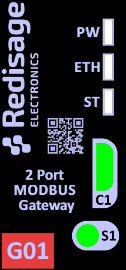
Fig. 1. Reference front label of G01-G03 and G11-G13
Ethernet Modbus converters G11-G13 have 5 LED indicators:
PW LED Blue - Power
ER LED Yellow - Error
ETH LED Green - Network activity
COM LED Green - RS232/RS485 activity
CN LED Yellow - Console mode
SR LED Red - Service mode
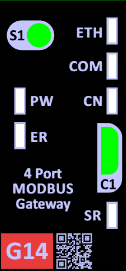
Fig. 2. Reference front label of G14-G16
Configuration by Web Page
Default configuration of ethernet converters:
IP adress: 192.168.100.100,
Subnet mask: 255.255.255.0
Gateway: 192.168.100.1
DNS 1: 192.168.100.1
DNS 2: 8.8.8.8
Default login:
User name: admin
Password: admin123
The network configuration of the device can be changed through the serial console which is described in the Configuration by serial console section.
To access to web page open the web browser, type the IP address in the address bar and log in using the default user name and password. The IP address of the device and PC must be in the same Local Area Network.
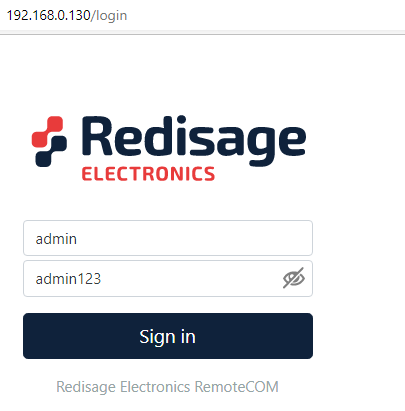
Fig. 3. Login panel on the web page
After succesuful login the status page will show current status of ports.
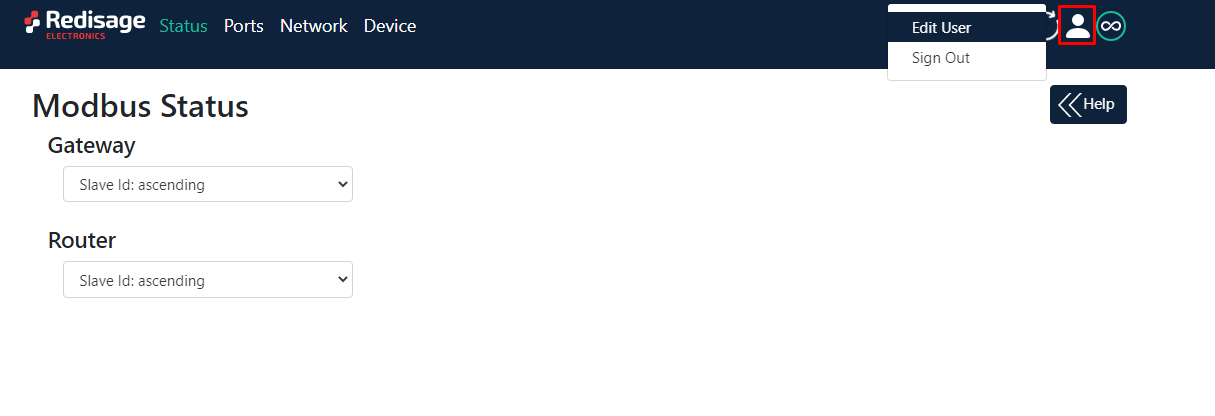
Fig. 4. Status page and edit user option
To change the user name and password click on the user icon and select edit user.
Ports configuration is possible on the ports page.
Configuration
Internal Modbus Address is qualified by Gateway/Router as a request for internal resources. Internal Modbus Address has a higher priority than Gateway Slave Address.
Idle Time [s] determines the time thread waits for the TCP connection. If time expired, the connection and thread are closed. Used only in Gateway Mode.
Ports Configuration
Uart Mode defines the port's role in the system. In Gateway Mode port is used to communicate with Modbus Slave. However, in Router Mode port is used to communicate with Modbus Master. Note the Routing Configuration section below if Router Mode is chosen.
Uart Protocol determines the protocol used for communication.
Gateway Slaves addresses of Modbus Slave Devices connected to Gateway UART ports. Multiple addresses can be written in one field, e.g. 9;11;14-17;80. This field is available only in Gateway Mode. Use * to select all not assigned addresses.
Saves Response Timeout [ms] specifies how long the Device will wait for a response from Modbus Slave.
Baud Rate determines the port's transmission speed over the data channel.
Data Bits determine the number of data bits in the port's message frame.
Parity enables/disables parity check in the port's message frame.
Stop Bits determines the number of stop bits in the port's message frame.
Termination enables/disables termination on the RS line.
Routing Configuration
Routing Slaves addresses of Modbus Slaves connected to Modbus Router. Multiple addresses can be written in one field, e.g. 9;11;14-17;80. Use * to select all not assigned addresses.
Slaves Response Timeout [ms] specifies how long the Device will wait for a response from Modbus Slave.
IP/Hostname determines IP address or Hostname of Modbus Slave.
TCP Port determines TCP port of Modbus Slave.
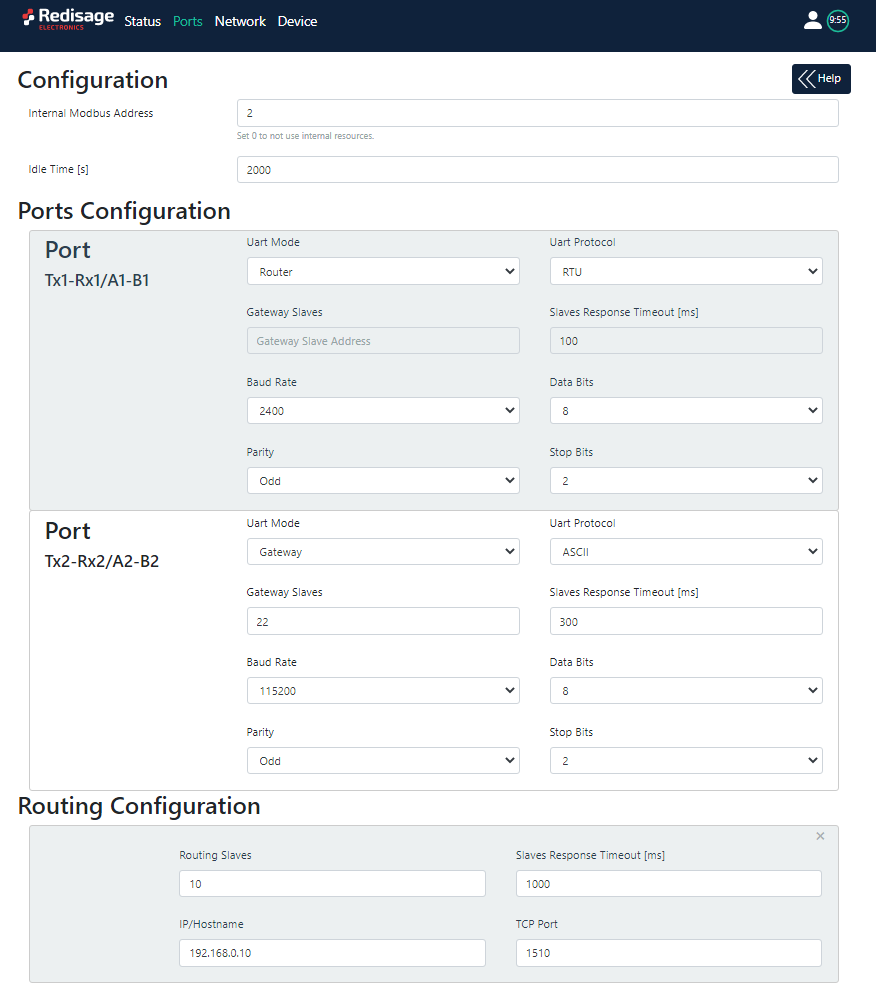
Fig. 5. Ports page
Network setting can be changed on the network page.
Hostname is the label that is assigned to the Device.
Configuration Method enables/disables the DHCP server. If the DHCP server is disabled, the IP Address of the Device has to be set manually.
IP Address of the Device.
Netmask associated with the IP Address.
Gateway address currently used by the Device.
DNS Address is the Domain Name System used by the Device.
MAC Settings allows setting the default MAC address or typing it manually.
MAC Address allows changing the physical address of the Device.
Services
HTTP port determines the port of the control panel.
Telnet Port allows connection with the device via Telnet.
Modbus TCP listening port uses as an entry point for new Modbus TCP connections.
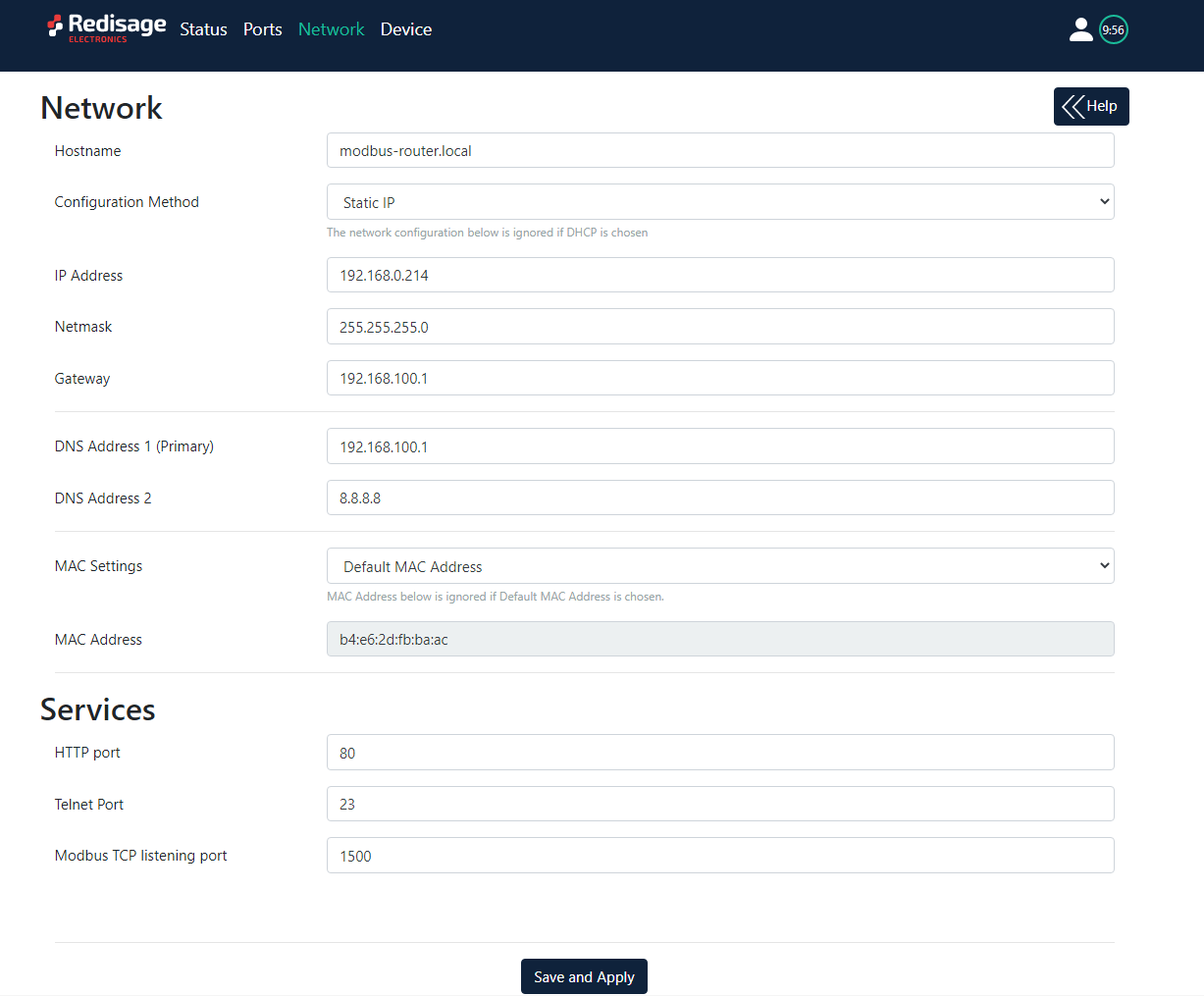
Fig. 6. Network page
On the device page, there is information about the Device, and tools to factory reset, firmware upgrade, and reboot the Device.

Fig. 7. Device page
Configuration by Serial Console
The device has the ability to be reconfigured via a serial console. C20-C23 and C30-C32 require a dedicated USB/UART converter connected to the USB micro-B connector on the front of the device. C23-C25 can be directly connected to a PC through a USB cable.
Procedure to enter serial console mode on C20-C23 and C30-C32:
- Turn off the power of the device
- Connect PC to the C1 micro-USB port using a dedicated USB/UART converter
- Press and hold the S1 button (or connect Din pin to GND pin if the button is not mounted)
- Turn on the power and wait a few seconds until the orange LED lights up
- Release the button (or disconnect Din pin from GND pin)
Procedure to enter serial console mode on C23-C25:
- Install STM32 Virtual COM Port Driver on your PC
- Turn off the power of the device
- Connect PC to the C1 micro-USB port using a USB cable (or use dedicated USB/UART converter)
- Press and hold the S1 button
- Turn on the power and wait a few seconds until the yellow CN LED lights up
- Release the button (or disconnect Din pin from GND pin)
Once this is done you can connect to the serial port. The baud rate of the serial port is 115200. Log in using the default username and password, then change the network settings using ipconfig command.
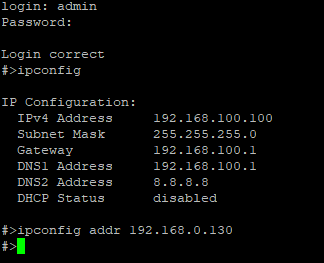
Fig. 8. Network IP change by serial console
List of all commands:
help - Prints the help.
conn - Prints active TCP connections.
net_stat - Prints lwIP statistics.
eth_mac - Print or change MAC address
ipconfig - Prints or changes the network configuration.
http_port - Prints or changes http port
telnet_port - Prints or changes telnet port
modbus_tcp_port - Prints or changes modbus port
ping - Tests connection with a remote host.
restart - Restarts system. Can also be used as reboot.
user - Prints or changes user configuration.
sys_heap_usage - Prints current heap usage.
modbus - Prints or changes Modbus settings
modbus_ports - Prints or changes Modbus ports settings
modbus_routing - Prints or changes Modbus routing settings
exit - Exits console
ipconfig available commands:
addr ADDRESS
Set IP addres to ADDRESS.
Example: ipconfig addr 192.168.0.10
mask NETMASK
Set subnet mask to NETMASK (in dot-decimal format).
Example: ipconfig mask 255.255.255.0
mask BIT_COUNT
Set subnet mask to BIT_COUNT bits.
Example: ipconfig mask 24
gateway GATEWAY_IP
Set network gateway to GATEWAY_IP.
Example: ipconfig gateway 192.168.0.1
dhcp enable|disable
Enable or disable DHCP client.
Example: ipconfig dhcp enable
dns1 ADDRESS
Set primary DNS to ADDRESS, disables getting DNS from DHCP if enabled.
dns2 ADDRESS
Set secondary DNS to ADDRESS, disables getting DNS from DHCP if enabled.
http_port available commands:
help
Print this help message
PORT_NUMBER
Set http port to PORT_NUMBER. A PORT_NUMBER value must be in range:
1-65535
Example: http_port 80
status
Print current http port
Example: http_port status
A current http port is 80
telnet_port available commands:
help
Print this help message
PORT_NUMBER
Set telnet port to PORT_NUMBER. A PORT_NUMBER value must be in range:
1-65535
Example: telnet_port 23
status
Print current telnet port:
Example: telnet_port status
A current telnet port is 23
modbus_tcp_port available commands:
help
Print this help message
PORT_NUMBER
Set http port to PORT_NUMBER. A PORT_NUMBER value must be in range:
1-65535
Example: modbus_port 1500
status
Print current Modbus port
Example: Modbus_port status
A current Modbus port is 1500
Modbus
Modbus {subcommand} [arguments]
Print or change Modbus configuration
subcommand - subcommand to execute
arguments - subcommand parameters
Subcommands:
help
Prints command help Example: Modbus help
idlet [value]
Shows or sets the idle TIME (in seconds) of the TCP connection after which the TCP
connection is terminated by the converter and the TCP socket is released.
Example: modbus idlet 720
int_addr [value]
Shows or sets internal Modbus address
Example: modbus int_addr 5
If a subcommand that normally sets a value is not given an argument,
it will print the current value.
Example:
modbus idlet
Set idle time is 5000
modbus_ports
modbus_ports {com_number} {subcommand} [arguments]
Print or change modbus_ports configuration
com_number - COM port number, as labeled in device's manual, to which
modbus applies
subcommand - subcommand to execute
arguments - subcommand parameters
Subcommands:
help
Prints command help, does not require com_number
Example: modbus_ports help
add_slaves [SLAVE_ADDR ;/- SLAVE_ADDR, *][]
Sets all addresses of slaves connected to com_port.
A star in value means fill rest free slaves. It means all slaves that are not set to other ports will be set to this one.
Example: modbus_ports 1 addslaves 124
Example: modbus_ports 1 addslaves 12-124
Example: modbus_ports 1 addslaves 12;14;18
Example: modbus_ports 1 addslaves 12;14-17;150-200
Example: modbus_ports 1 addslaves 12;14-17;150-200, *
show_slaves
Show addresses of slaves connected to com_port
Example: modbus_ports 1 showslaves
mode [ascii/rtu]
Sets Modbus port mode to ASCII or RTU
Example: modbus_ports 2 mode ascii
baud [RATE]
Sets the baud rate to RATE. For a list of acceptable baud rates, please
refer to the manual.
Example: modbus_ports 1 baud 9600
bits [CPS]
Sets bit count to C, parity to P, and stop bits to S. Valid values are:
C: 7, 8 or 9
P: N, E or O
S: 1 or 2
Example: modbus_ports 1 bits 8N1
Example: modbus_ports 2 bits 7O1
state [GATEWAY/ROUTER/DISABLE]
Enable or disable uart functionality
Example: modbus_ports 1 state GATEWAY
Example: modbus_ports 2 state DISABLE
termination [on/off]
Enable or disable termination on RS485 port
Example: modbus_ports 1 termination on
slave_response_timeout [TIMEOUT]
Set response timeout(serial slave) in ms. When this timeout expires,
delayed frames are dropped.
Example: modbus_ports 1 slave_response_timeout 2000
If a subcommand that normally sets a value is not given an argument,
it will print the current value.
Example:
#>modbus_ports 2 baud
Set baud rate is 115200
modbus_routing
Print or change the Modbus routing for router mode uart ports.
Subcommands:
help
Print routing's help
Example: routing help
show
Display all active routing table in system
[LP]: [SLAVES NUMBERS] [IP/HOSTNAME] [PORT] [TIMEOUT]
add SLAVE_ADDR HOSTNAME PORT TIMEOUT
Add new Modbus Routing Table record.
SLAVE_ADDR with HOSTNAME PORT is used by uarts working in Modbus router mode. TIMEOUT(in ms) is used to close the connection if a slave is not
responding.
The maximum records is 8.
One record for one adress/ip.
Example: modbus_routing add 18 192.168.0.10 502 2000
Example: modbus_routing add 18;25 192.168.0.10 502 2000
Example: modbus_routing add 18-25 192.168.0.10 502 2000
Example: modbus_routing add 18-25;* 192.168.0.10 502 2000
Example: modbus_routing add 18-25 modbus.local 502 2000
remove HOSTNAME_NUMBER/all
Remove Modbus Routing Table record
HOSTNAME_NUMBER is line number from /show/ command
Example: modbus_routing remove 2
Example: modbus_routing remove all
Configuration by Telnet Console
Acces to telnet console can be obtained using a serial terminal program. Configure the connection type to telnet, enter IP address and telnet port number (23 by default).
Console commands are the same as described in the serial console section.
Reset to Factory Defaults
Reset to factory defaults is possible on the web page in the device section or using service mode.
Steps to enter service mode on C23-25:
- Turn off the power
- Connect PC to the C1 micro-USB port using a dedicated USB/UART converter
- Press and hold the S1 button
- Turn on the power and wait until the red SR LED starts blinking
- Release the button
- Connect to the device through a serial terminal, the baud rate of the serial port is 115200
- Use command defaults to reset application variables to defaults
Steps to enter service mode on C22-C25 and C30-C32:
- Turn off the power,
- Connect PC to the micro USB-B port C1a on the front of the device using a dedicated USB/UART converter
- Press and hold the S1 button (or connect Din pin to GND pin if the button is not mounted)
- Turn on the power and wait a few seconds until the ST LED starts blinking
- Release the button (or disconnect Din pin from GND pin)
- Connect to the device through a serial terminal, the baud rate of the serial port is 115200
- Use command defaults to reset application variables to defaults
Service mode commands:
help Prints the help.
credits Print current credits value for this device
dev_ident Print the device identification value.
restart Restart the system.
serial_num Print the serial number of this device.
version Display the bootloader version
xmodem Download image to the internal Flash using xmodem
defaults Reset application variables to defaults.
ipconfig Print or change the network configuration.
Related Information and Links | ||
|---|---|---|
Ordering Information | Accessory | Similar Products |
Products Family Sample Photo
DISCLAMER NOTES
ALL PRODUCT, PRODUCT SPECIFICATIONS, AND DATA ARE SUBJECT TO CHANGE WITHOUT NOTICE TO IMPROVE RELIABILITY, FUNCTION OR DESIGN OR OTHERWISE.

